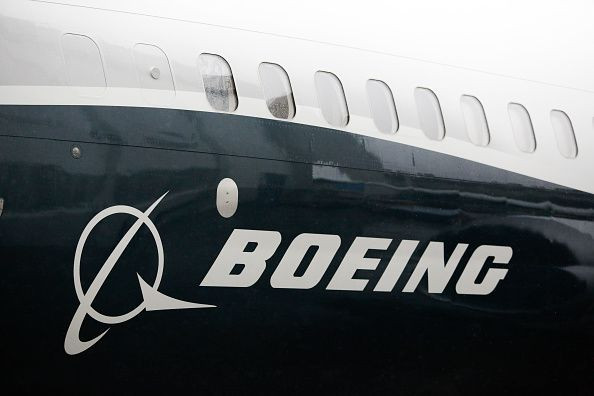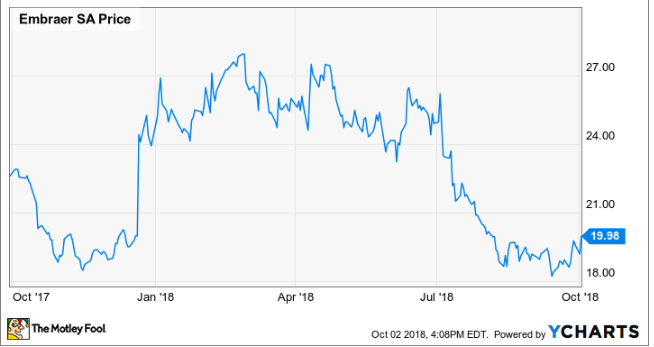Boeing, Embraer May Partner To Build KC-390s In The US

A few months ago, Embraer (NYSE:ERJ) and Boeing (NYSE:BA) officially announced a plan for Boeing to assume majority ownership of Embraer's commercial aviation business. Given that Embraer currently generates more than half of its revenue and virtually all of its profit from its commercial aviation segment, investors have naturally devoted nearly all of their attention to the evolving plans for this tie-up.
This article originally appeared in the Motley Fool.
However, Embraer's long-suffering defense business is poised for a return to growth next year. Furthermore, a recently revealed plan for Boeing and Embraer to partner on a U.S. production facility for the KC-390 military tanker/transport jet could enable strong growth in that business going forward.
The opportunity is substantial
Embraer has been developing the KC-390 for about a decade. It's a flexible, multi-mission aircraft that competes directly with Lockheed Martin's (NYSE:LMT) workhorse C-130.
The C-130 was originally developed by Lockheed in the 1950s, although it's been modernized repeatedly since then. There are about 1,100 C-130s in service today. The most updated model -- the C-130J Super Hercules -- accounts for less than half of that total. As a result, Embraer sees a potential replacement market of more than 700 aircraft globally in the coming years.
Of course, Lockheed Martin hopes to capture the majority of that replacement demand with updated versions of the C-130. The C-130 does have some advantages. Its turboprop design makes it extremely rugged and gives it excellent "short-field" performance. However, the KC-390 will be able to carry a heavier payload, while traveling faster and at a higher altitude, thanks to its jet engines. Importantly, it also will have a lower price tag than Lockheed Martin's C-130J.
The Brazilian Air Force has sponsored the KC-390 development process and has ordered 28 KC-390s. Deliveries will begin next year following a slight delay related to a ground testing mishap back in May.
U.S. production could be the key to U.S. sales
Embraer has estimated the KC-390 export opportunity at as much as $1.5 billion annually. For comparison, Embraer currently projects that its entire defense segment will generate between $800 million and $900 million of revenue in 2018.
However, while there have been expressions of interest from Argentina, Chile, Colombia, the Czech Republic, and Portugal, none of those countries has placed a firm order yet. The prospect of sales to the U.S. -- the largest potential buyer -- seems even more remote today. Yet getting the U.S. military on board could be the key to validating the worthiness of the KC-390, and thereby driving additional international orders.
In the current political climate, convincing the U.S. military to replace the C-130 -- designed and built in America by Lockheed Martin -- with a foreign product would be a tough sell. That's why Embraer has long been interested in partnering with Boeing for sales and support of the KC-390 in the U.S. and other markets where Boeing is already a trusted military contractor.
The latest proposal being entertained by the two companies calls for a Boeing-Embraer joint venture to open a U.S. production line for the KC-390 to complement the existing one in Brazil. The financial details haven't been decided yet, but the strategic merit of this plan is clear. A Boeing-sponsored, U.S.-built KC-390 would have a legitimate shot at capturing a part of the U.S. military's C-130 replacement needs.
Embraer stock is cheap
Embraer stock has been extremely volatile over the past year. It has gyrated between $18 and $28 (roughly speaking) as the expected terms of its commercial aviation tie-up with Boeing have changed. But recently, the stock has been stuck near the low end of that range.

Embraer still doesn't look especially cheap based on conventional metrics. The stock trades for 17 times its projected 2019 earnings. However, analyst estimates don't capture the benefit of Embraer's planned commercial aviation alliance with Boeing. While there's some risk that the deal could fall apart due to political pressure in Brazil, it's still likely to be completed by the end of 2019. That will pave the way for Embraer to return a substantial amount of cash to investors.
Boeing's powerful sales organization and massive scale should make the Embraer commercial jet business even more profitable, increasing the value of Embraer's 20% stake in the future joint venture.
Meanwhile, a KC-390 sales and production partnership -- combined with the beginning of KC-390 deliveries from Embraer's production facility in Brazil -- could drive strong growth in the defense business. That would complement an upturn in the executive jet business (Embraer's other main operating segment), which is finally on track to benefit from stronger demand.
Embraer's current market cap of $3.7 billion is less than the $3.8 billion the company is set to receive from Boeing for 80% of its commercial jet business. Investors are effectively treating the defense and executive jet segments as worthless. That hints at substantial upside for patient investors in Embraer stock.
Adam Levine-Weinberg owns shares of Embraer. The Motley Fool recommends Embraer. The Motley Fool has a disclosure policy.





















